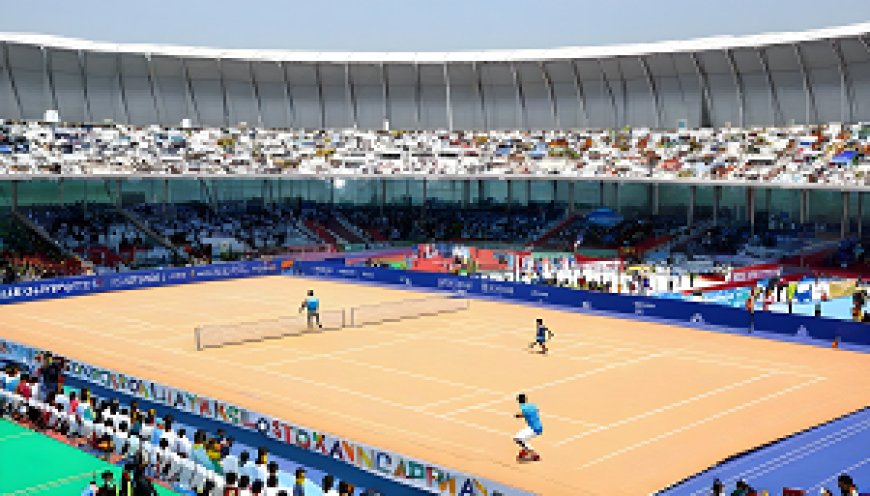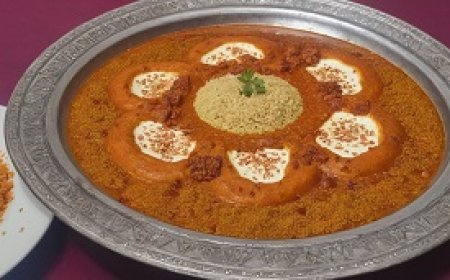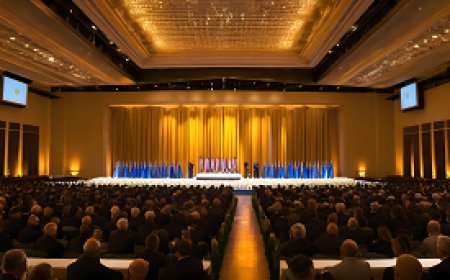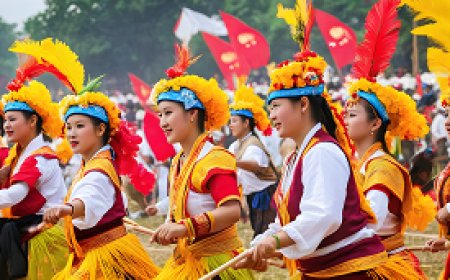Mind Sports Olympiad
The Mind Sports Olympiad represents a unique challenge that combines rationality and competition in a diverse array of games and activities requiring intelligence and strategy. This exceptional event includes classic games such as chess and backgammon, along with modern games based on mental skills like Sudoku and mathematical puzzles. Participants from different ages and cultures come together at the Mind Sports Olympiad to exchange experiences and compete in an environment that encourages creative thinking and the development of mental skills. This event highlights the role of the mind and strategic thinking in enriching individuals' lives and promoting sportsmanship through engaging intellectual interaction.

The Mind Sports Olympiad represents an exceptional experience where enthusiasts and professionals come together to challenge each other in a unique world of mental games. This event reflects an exciting competitive spirit and provides a platform for creative minds to excel in a variety of mental challenges. The Mind Sports Olympiad combines chess, puzzle games, and other mental sports challenges, where participants compete in a dynamic environment based on strategic thinking and intellectual creativity. This event is characterized by encouraging intellectual interaction and developing participants' mental skills, making it a global meeting for creative minds to compete in achieving mental completeness and innovative thinking.
Diversity in Mental Challenges
The Mind Sports Olympiad (MSO) is a unique and prestigious event that celebrates intellectual prowess and strategic thinking. At the heart of this competition lies a diverse array of mental challenges, encompassing a wide range of games that test participants' cognitive abilities, creativity, and strategic acumen. The incorporation of diversity in mental challenges not only adds richness to the MSO but also fosters inclusivity and welcomes participants with varying skill sets. Let's explore how diversity in mental challenges plays a pivotal role in enhancing the Mind Sports Olympiad.
1. Variety of Games:
-
Strategic Board Games: The MSO features a variety of strategic board games such as chess, shogi, and Go. These games require deep analytical thinking, foresight, and planning. Each game brings a unique cultural and strategic perspective, attracting participants with different backgrounds and preferences.
-
Card Games: From classics like Poker to modern card games, the inclusion of card games adds an element of unpredictability and adaptability. Participants need to strategize based on the cards they are dealt, testing their decision-making skills in dynamic scenarios.
-
Abstract Games: Games like Pentamind and Abalone fall into the category of abstract games, challenging participants to think outside the box. These games emphasize creativity, pattern recognition, and the ability to formulate unconventional strategies.
-
Word Games: Scrabble, Boggle, and other word games showcase linguistic prowess and vocabulary mastery. Participants engage in mental gymnastics as they form words, anticipate opponents' moves, and maximize their scores.
2. Inclusivity and Accessibility:
-
Varied Skill Levels: The diverse range of mental challenges caters to participants with different skill levels. Whether you are a seasoned grandmaster or a novice, there's a game that aligns with your proficiency, promoting a sense of inclusivity and encouraging individuals to participate regardless of their experience.
-
Cross-Cultural Appeal: Games from different cultural origins attract participants from various backgrounds. This cross-cultural appeal not only adds a global flavor to the MSO but also allows participants to appreciate and learn from diverse gaming traditions.
3. Cognitive Diversity:
-
Analytical Thinking: Strategic board games emphasize analytical thinking and planning several moves ahead. Participants engage their analytical skills, honing their ability to foresee consequences and adapt their strategies based on the evolving game dynamics.
-
Creative Problem-Solving: Abstract and unconventional games require creative problem-solving. Participants are challenged to approach situations from different perspectives, fostering innovation and adaptability in their thinking.
-
Memory and Vocabulary: Word games contribute to cognitive diversity by testing memory and vocabulary. Participants enhance their verbal skills, memory recall, and linguistic agility, showcasing a different facet of mental acuity.
4. Mental Agility and Adaptability:
-
Dynamic Challenges: Card games introduce an element of randomness and unpredictability. Participants need to demonstrate mental agility by adapting their strategies to ever-changing circumstances, making split-second decisions, and staying ahead of their opponents.
-
Quick Decision-Making: Some games, like speed chess or rapid-fire quizzes, require quick decision-making. This aspect of mental agility challenges participants to think on their feet, enhancing their ability to process information rapidly.
5. Educational and Recreational Balance:
-
Learning Opportunities: The diversity in mental challenges provides participants with continuous learning opportunities. Whether it's mastering a new chess opening, exploring the intricacies of an abstract game, or expanding one's vocabulary, the MSO becomes a platform for intellectual growth.
-
Recreational Enjoyment: While the MSO is a competitive event, the diverse array of mental challenges ensures that participants find recreational enjoyment in the games. The balance between competition and enjoyment makes the event appealing to a broad audience.
6. Community Building:
-
Shared Interests: The Mind Sports Olympiad serves as a meeting ground for individuals with shared intellectual interests. Participants bond over their love for strategy, problem-solving, and the joy of competition, fostering a sense of community.
-
Networking Opportunities: The diversity in mental challenges encourages networking among participants. Whether discussing chess strategies, sharing tips for word games, or exchanging insights on abstract games, individuals connect over their shared passion for mind sports.
Diversity in mental challenges is the cornerstone of the Mind Sports Olympiad's success. By offering a broad spectrum of games that appeal to participants with varied skills and interests, the MSO creates an inclusive and enriching environment. The event not only celebrates the intellectual diversity of its participants but also serves as a testament to the universal appeal of mind sports. As the MSO continues to evolve, embracing new games and participants, it remains a dynamic celebration of the myriad ways in which the human mind can excel and find joy in strategic and creative endeavors.
Encouragement of Creative Thinking
Mental games, ranging from strategic board games to abstract puzzles, play a pivotal role in fostering creative thinking. These games not only entertain but also stimulate the mind, encouraging participants to think outside the box, innovate in their strategies, and develop a deeper level of problem-solving skills. Let's delve into how mental games contribute to the encouragement of creative thinking and innovation among participants.
1. Diverse Challenges:
-
Strategic Board Games: Games like chess, shogi, and Go require players to plan and strategize multiple moves ahead. This strategic thinking encourages participants to explore innovative approaches and anticipate their opponents' responses.
-
Abstract and Puzzle Games: Engaging in abstract games such as Pentamind or solving intricate puzzles challenges the mind to find unconventional solutions. These games often lack a set formula, prompting participants to think creatively and devise new strategies on the spot.
-
Word Games: Scrabble and other word games demand creativity in forming words and maximizing points. Participants need to think creatively about word placement, considering both immediate gains and long-term strategic advantages.
2. Adaptive Strategies:
-
Changing Game Dynamics: Many mental games involve changing dynamics, requiring participants to adapt their strategies quickly. This adaptability fosters creative thinking as players must respond to unpredictable situations, adjusting their plans on the fly.
-
Card Games: Card games introduce an element of randomness, challenging participants to innovate based on the cards they receive. Creative adaptation to varying card combinations becomes a key aspect of success in these games.
3. Problem-Solving in Real-Time:
-
Abstract Challenges: Abstract games often present unique challenges that require real-time problem-solving. Participants must analyze the current state of the game, identify patterns, and formulate creative solutions on the spot.
-
Strategic Thinking: Strategic board games necessitate thinking several steps ahead, but the unpredictable nature of opponents' moves adds an element of real-time problem-solving. This dynamic environment encourages participants to think creatively in response to evolving situations.
4. Promotion of Innovation:
-
Unconventional Approaches: Mental games, especially those with abstract or open-ended components, allow for unconventional approaches. Participants are not bound by rigid rules, encouraging them to experiment with innovative strategies that may catch opponents off guard.
-
Learning from Mistakes: Creativity often thrives in an environment that allows for experimentation and learning from mistakes. Mental games provide a platform where participants can try out novel ideas, assess their effectiveness, and continuously refine their strategies.
5. Mental Gymnastics:
-
Pattern Recognition: Many mental games involve pattern recognition, a cognitive skill closely tied to creative thinking. Recognizing patterns allows participants to predict opponents' moves, devise counter-strategies, and approach challenges from different perspectives.
-
Lateral Thinking: Abstract and puzzle games often require lateral thinking – the ability to approach problems from unconventional angles. This type of thinking stimulates creativity and encourages participants to explore non-linear solutions.
6. Collaborative Creativity:
-
Team Games: Some mental games involve teamwork, where participants collaborate to achieve a common goal. This collaborative environment fosters shared creative thinking, as team members brainstorm ideas, combine their strengths, and innovate collectively.
-
Strategic Discussions: Strategic board games often include discussions and negotiations. This interaction encourages participants to share their creative ideas, propose unique strategies, and engage in strategic debates, contributing to a pool of innovative thinking.
7. Cognitive Flexibility:
-
Switching Strategies: Mental games often require participants to switch strategies based on the evolving game dynamics. This cognitive flexibility is a key component of creative thinking, allowing individuals to adapt to changing circumstances and explore diverse approaches.
-
Open-Mindedness: Creative thinking thrives in an open-minded environment. Mental games challenge participants to consider various possibilities, embrace novel concepts, and remain open to unconventional strategies, fostering a mindset conducive to innovation.
Mental games serve as dynamic platforms that go beyond mere entertainment. They are catalysts for creative thinking, pushing participants to explore new ideas, adapt to changing scenarios, and innovate in their approaches. Whether engaging in strategic board games, abstract puzzles, or word challenges, participants in mental games embark on a journey of cognitive exploration, honing their creative thinking skills and discovering innovative solutions to complex problems. As these games continue to captivate minds, they play a vital role in nurturing a culture of creativity and strategic innovation.
Platform for Cultural Exchange
The concept of a platform for cultural exchange revolves around bringing together participants from diverse cultural backgrounds to create an environment conducive to the exchange of experiences and the promotion of mutual understanding. This platform serves as a melting pot of traditions, beliefs, and practices, fostering global harmony and creating a rich tapestry of shared experiences. Let's delve into the details of how such a platform operates and the profound impact it can have on participants.
1. Diversity in Participation:
-
Multicultural Participants: The essence of a cultural exchange platform lies in its ability to attract participants from various corners of the globe. Individuals representing different countries, ethnicities, and traditions converge, bringing a rich tapestry of diversity to the platform.
-
Varied Perspectives: Participants bring with them a wealth of cultural perspectives, shaped by their unique backgrounds. This diversity enriches the exchange by providing a wide array of viewpoints, fostering an environment where participants can learn from one another.
2. Shared Cultural Practices:
-
Showcasing Traditions: Cultural exchange platforms often include activities that allow participants to showcase their traditional practices. This could range from dance and music performances to demonstrations of traditional crafts, providing a firsthand experience of each culture's richness.
-
Workshops and Demonstrations: Workshops and demonstrations become avenues for sharing knowledge about cultural practices. Participants can actively engage in learning about rituals, art forms, and customs, creating a dynamic environment of cultural exploration.
3. Language and Communication:
-
Multilingual Environment: The interaction between participants unfolds in a multilingual setting, creating an atmosphere where various languages coexist. This linguistic diversity becomes a tool for cultural exchange as participants learn to communicate and appreciate linguistic nuances.
-
Language Learning Opportunities: Cultural exchange platforms offer participants the chance to learn phrases or expressions from different languages. This language learning aspect not only facilitates communication but also deepens cultural understanding.
4. Storytelling and Narratives:
-
Sharing Personal Stories: Participants often share personal narratives, anecdotes, and stories from their cultural backgrounds. This storytelling aspect humanizes cultural experiences, allowing others to connect emotionally and empathize with the diverse journeys of individuals.
-
Cultural Narratives: Beyond personal stories, participants may delve into broader cultural narratives, myths, and histories. This exploration helps in dispelling stereotypes and misconceptions, fostering a more nuanced understanding of each culture.
5. Culinary Exploration:
-
Food as a Cultural Ambassador: Cuisine plays a pivotal role in cultural exchange. Participants may have the opportunity to share and taste traditional dishes, unraveling the flavors and stories behind each culinary creation. This sensory experience becomes a powerful bridge between cultures.
-
Cooking Workshops: Cooking workshops allow participants to actively engage in preparing traditional dishes. This hands-on experience not only introduces them to new flavors but also provides a deeper understanding of the cultural significance of various ingredients and cooking methods.
6. Artistic Expressions:
-
Visual and Performing Arts: Cultural exchange often involves visual arts, music, dance, and other forms of artistic expression. Participants may witness performances, art exhibitions, or even engage in collaborative artistic projects that blend different cultural influences.
-
Collaborative Projects: Joint artistic endeavors enable participants to create something that reflects the fusion of diverse cultural elements. This collaborative creativity fosters a sense of unity and shared expression.
7. Workshops on Cultural Sensitivity:
-
Promoting Understanding: Workshops on cultural sensitivity and diversity provide a structured platform for discussing the nuances of various cultures. These sessions aim to promote understanding, respect, and appreciation for differences, fostering a harmonious environment.
-
Addressing Stereotypes: Cultural exchange platforms actively work to address and break down stereotypes. By providing accurate information and personal interactions, participants have the opportunity to challenge preconceived notions and build more accurate perceptions.
8. Networking and Building Connections:
-
Global Networking: Participants not only exchange cultural knowledge but also build networks and connections on a global scale. These connections extend beyond the event, creating a lasting impact on personal and professional levels.
-
Friendship and Collaboration: The platform facilitates the forging of friendships and collaborations. Participants, having shared cultural experiences, are more likely to collaborate on future projects, bridging gaps and fostering ongoing cultural dialogue.
A platform for cultural exchange serves as a dynamic arena where individuals from diverse cultural backgrounds come together to celebrate, learn, and understand one another. It breaks down barriers, promotes tolerance, and nurtures a global community where the richness of each culture contributes to a collective tapestry of shared humanity. In an interconnected world, such platforms play a crucial role in fostering a spirit of unity, respect, and appreciation for the myriad cultures that make up our global society.
Mind Sport
The concept of mind sports has gained prominence in the realm of competitive activities, and the Mind Sports Olympiad (MSO) stands out as a distinguished platform dedicated to fostering mental sports and the advancement of cognitive skills. Let's delve into the details of what defines mind sports, the role of the Mind Sports Olympiad, and the broader impact on mental development.
1. Understanding Mind Sports:
-
Cognitive Challenges: Mind sports encompass a wide range of competitive activities that primarily focus on mental skills rather than physical prowess. These games involve strategic thinking, problem-solving, memory, and decision-making, challenging participants on an intellectual level.
-
Diverse Games: Mind sports include a diverse array of games, such as chess, bridge, poker, Scrabble, and various mathematical and logic-based puzzles. Participants engage in these games to not only compete but also to enhance their mental acuity and strategic thinking.
2. The Mind Sports Olympiad (MSO):
-
Celebrating Mental Excellence: The Mind Sports Olympiad, established as an annual event, serves as a celebration of mental excellence. It brings together participants from around the world to compete in a wide array of mind sports, showcasing the diversity and complexity of intellectual pursuits.
-
Multidisciplinary Competition: MSO is unique in its multidisciplinary approach, offering competitions in chess, card games, board games, and various mind challenges. This inclusivity ensures that participants can explore different facets of mental sports, fostering a holistic approach to cognitive development.
-
International Participation: The Olympiad attracts participants of all ages and backgrounds, creating a global community of individuals passionate about mental challenges. This international participation contributes to the exchange of ideas and strategies, enriching the overall experience.
3. Development of Mental Skills:
-
Strategic Thinking: Mind sports, including those featured in the MSO, require strategic thinking and planning. Participants engage in games that demand foresight, adaptability, and the ability to anticipate opponents' moves, honing their strategic thought processes.
-
Memory Enhancement: Many mind sports involve memorization, whether it's recalling chess openings, remembering card sequences, or retaining information in word games. This continual exercise in memory enhancement contributes to cognitive health and recall abilities.
-
Problem-Solving Abilities: Games like chess and puzzles challenge participants to solve complex problems in real-time. The iterative nature of mind sports fosters the development of effective problem-solving techniques and the ability to think critically under pressure.
-
Decision-Making under Pressure: Competitive environments in mind sports simulate real-world scenarios where quick and effective decision-making is crucial. Participants learn to make sound decisions under time constraints, enhancing their ability to handle stress and perform under pressure.
4. Community Building and Camaraderie:
-
Shared Passion: The Mind Sports Olympiad serves as a nexus for individuals who share a passion for mental challenges. Participants bond over their shared interests, creating a sense of camaraderie and a supportive community that extends beyond the competition.
-
Knowledge Exchange: The Olympiad becomes a hub for the exchange of strategies, tactics, and insights among participants. This knowledge-sharing aspect not only enhances individual skills but also contributes to the collective growth of the mind sports community.
5. Educational Impact:
-
Promoting Intellectual Pursuits: MSO plays a crucial role in promoting intellectual pursuits as a form of entertainment and competition. By highlighting the intellectual richness of mind sports, it encourages individuals, especially the younger generation, to engage in activities that stimulate their minds.
-
Cognitive Benefits for Youth: Participation in mind sports has been linked to cognitive benefits for young individuals, including improved academic performance, enhanced concentration, and the development of critical thinking skills. MSO becomes a platform for fostering these cognitive advantages.
6. Evolution of Mind Sports:
-
Adaptation to Modern Challenges: Mind sports continually evolve to incorporate modern challenges and interests. MSO, as a leading platform, adapts its offerings to reflect the changing landscape of mental pursuits, ensuring relevance and appeal to a broad audience.
-
Integration of Technology: The integration of technology in mind sports, such as online chess tournaments and digital adaptations of traditional games, showcases the adaptability of the Mind Sports Olympiad to contemporary trends, making it accessible to a global audience.
7. Recognition of Mental Achievements:
-
Mental Fitness as a Priority: The Mind Sports Olympiad underscores the significance of mental fitness and recognizes mental achievements on par with physical accomplishments. This emphasis contributes to a broader societal acknowledgment of the importance of nurturing cognitive skills.
-
Inclusivity and Diversity: By celebrating achievements in mind sports, MSO promotes inclusivity and diversity in the realm of competitive activities. It breaks traditional stereotypes by showcasing the intellectual prowess of individuals from various backgrounds and age groups.
The Mind Sports Olympiad stands as a beacon for those who appreciate the power of the mind in competitive pursuits. By offering a diverse range of mind sports competitions, fostering a global community, and emphasizing the development of mental skills, MSO contributes significantly to the promotion of intellectual pursuits and the recognition of mental excellence. In a world where mental agility is increasingly valued, the Mind Sports Olympiad serves as a testament to the enduring appeal and significance of mind sports in shaping cognitive abilities and fostering a community of passionate and intellectually driven individuals.
Enhancement of Social Interaction
The event provides an opportunity for participants to socially interact and connect with individuals who share similar interests. This social aspect of the event plays a vital role in fostering social bonds and expanding the circle of communication. Let's review some key points in this context:
1. Connecting with Individuals with Common Interests:
-
Building an Enthusiastic Community: Gathering around a common event in the realm of shared interests builds an enthusiastic community. Individuals sharing the same passion meet, fostering a collective spirit and a sense of belonging.
-
Exchanging Experiences: Participants can exchange experiences and knowledge in their common field, contributing to enriching discussions and deepening mutual understanding.
2. Creating Social Networks:
-
Personal Interaction: Individuals have the opportunity for personal interaction with others, whether during event periods or accompanying social activities. This interaction can lead to the establishment of lasting friendships.
-
Building Professional Networks: Alongside social interaction, the event can contribute to building professional networks. Professionals in various fields meet, opening avenues for collaboration and partnerships.
3. Enhancing Understanding and Appreciation:
-
Providing a Platform for Cultural Exchange: Through interacting with individuals from diverse cultural backgrounds, participants can enhance mutual understanding and appreciation.
-
Stimulating Dialogue: Social interaction encourages constructive dialogues on various topics. This cultural and intellectual exchange can be fruitful and beneficial for everyone.
4. Interaction Beyond the Event:
-
Positive Impact on Daily Life: The impact of social interaction can extend to daily life, where individuals can benefit from new relationships and open themselves to new experiences and opportunities.
-
Encouraging Social Engagement: Social interaction in joint events inspires participants to engage socially beyond the event, promoting awareness and involvement in the community.
5. Positive Impact on Psychological Well-being:
-
Social Connection and Psychological Well-being: Effective social connection is linked to improved psychological well-being, where individuals can feel supported and understood.
-
Reducing Social Isolation: Active social interaction contributes to reducing levels of social isolation and enhancing integration into the community.
By providing these opportunities for communication and social interaction, events play a crucial role in creating a vibrant and supportive environment. Individuals can build new relationships, exchange experiences, and enhance mutual understanding, contributing to improving the quality of social and psychological well-being.
Global Challenges
The Mind Sports Olympiad (MSO) serves as a unique platform for global challenges, bringing together participants from various parts of the world to engage in intellectual competitions and foster cultural exchange. This convergence of diverse talents and perspectives contributes to a rich and dynamic event. Let's delve into the details of how the Olympiad addresses global challenges:
1. International Representation:
-
Diverse Participants: The Olympiad attracts participants from different countries, representing a wide array of cultures, languages, and backgrounds. This diversity enhances the global character of the event.
-
Inclusivity: The inclusivity of the Olympiad ensures that individuals from various regions, regardless of their socio-economic status or geographical location, can participate. This fosters a sense of equality and fairness.
2. Global Competition:
-
High-Level Competition: Participants at the Olympiad often include world-class competitors, representing the pinnacle of intellectual achievement in their respective fields. The global nature of the competition elevates the standards and intensifies the challenge.
-
Cross-Cultural Competitiveness: The Olympiad provides a stage where individuals compete not only intellectually but also culturally. Different approaches, strategies, and problem-solving techniques from diverse cultural backgrounds enrich the competitive experience.
3. Cultural Exchange:
-
Celebration of Diversity: The Olympiad celebrates cultural diversity through various activities, presentations, and events. Participants have the opportunity to share aspects of their culture, fostering mutual respect and understanding.
-
Networking and Collaboration: Cultural exchange goes beyond the competition, as participants interact in informal settings. Networking and collaboration during the Olympiad create a global community of like-minded individuals.
4. Language and Communication:
-
Multilingual Environment: The Olympiad operates in a multilingual environment, with participants communicating in different languages. This linguistic diversity adds a layer of complexity and richness to the global interaction.
-
Language as a Bridge: Despite linguistic differences, the shared passion for mind sports serves as a universal language, breaking down communication barriers and facilitating connections among participants.
5. Addressing Global Issues:
-
Promoting Intellectual Solutions: The Olympiad, by bringing together brilliant minds from around the world, becomes a platform for discussing and addressing global challenges. Intellectual solutions and innovative ideas emerge through collaborative efforts.
-
Raising Awareness: The event raises awareness about global issues by incorporating relevant themes into the competitions and discussions. This helps in promoting a sense of global citizenship among participants.
6. Technology and Accessibility:
-
Virtual Participation: Advancements in technology allow for virtual participation, enabling individuals from remote corners of the world to engage in the Olympiad. This inclusiveness reflects the global nature of the challenges being tackled.
-
Utilizing Online Platforms: The Olympiad leverages online platforms to facilitate global interactions, competitions, and cultural exchanges. This integration of technology enhances accessibility and broadens participation.
7. Educational Impact:
-
Inspiring Future Generations: The global nature of the Olympiad serves as an inspiration for future generations. Young minds witnessing the international collaboration and competition may be motivated to contribute to global problem-solving.
-
Educational Outreach: The Olympiad often includes educational components that aim to create awareness about global challenges. Workshops, seminars, and presentations provide a platform for sharing knowledge and insights.
the Mind Sports Olympiad, with its international representation, global competition, cultural exchange, and focus on addressing global challenges, stands as a beacon of intellectual collaboration and understanding. It showcases the potential of human intellect to transcend geographical boundaries and collectively work towards solutions for the challenges facing our interconnected world.
Traditional and Modern Sporting Events: The event combines traditional and modern games to cater to diverse interests.
Appreciation for Human Intelligence: The Olympiad officially recognizes the strength and capabilities of human intelligence in strategic thinking.
Stimulating Environment for Youth: The event creates a stimulating environment for youth to develop their mental skills and achieve accomplishments.
Promotion of Innovation and Creativity: The Mind Sports Olympiad encourages innovation and creativity by presenting inspiring intellectual challenges.
Conclusion
the Mind Sports Olympiad, it becomes clear that this remarkable event serves as a meeting ground for creative and competitive minds in a unique arena. This Olympiad not only embodies a platform for the convergence of classic and contemporary mental games but also an opportunity for cultural exchange and knowledge-sharing among participants from around the globe. This unique experience encourages the development of mental skills and innovation, adding immeasurable value to the journey of intellectual advancement. The Mind Sports Olympiad remains a testament to the extraordinary capability of the human mind for challenge and excellence, continuing to serve as a source of inspiration for future generations to cultivate their abilities and explore the boundaries of their mental potential.
Sources
What's Your Reaction?

















































































































